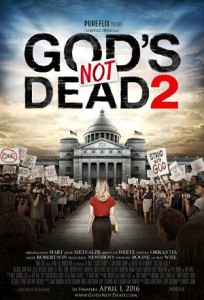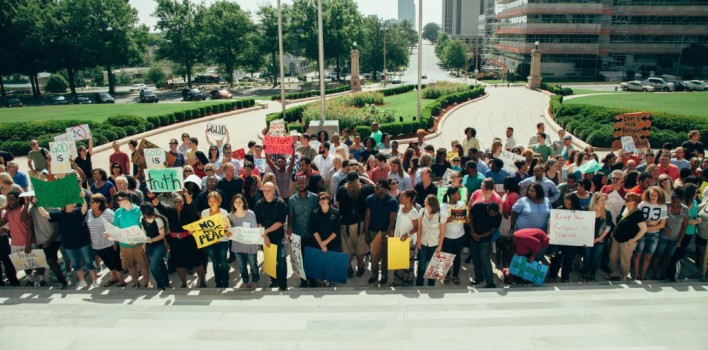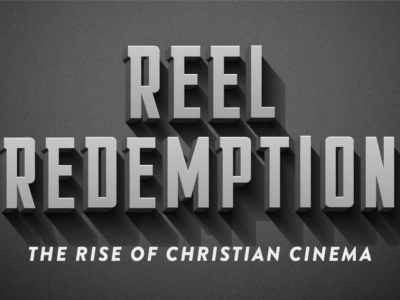Review| Evidence, Philosophy, and ‘God’s Not Dead 2’ (Alternate Take)
 Last night a surprising thing happened. I saw God’s Not Dead 2 and ended up defending it to a friend. Today the surprises continue and I’m going to recommend that some of you should see it too.
Last night a surprising thing happened. I saw God’s Not Dead 2 and ended up defending it to a friend. Today the surprises continue and I’m going to recommend that some of you should see it too.
When the last God’s Not Dead film came out, I saw it on opening day. As a Christian that entered philosophy because I want to make a difference for the kingdom, the plot of the first film was irresistible to me. I left the film furious. Every atheist was an angry, hate-filled villain or future convert. No philosopher in the film actually did philosophy (we don’t spend our time slinging quotes at each other). Finally, it was a bad presentation of the Gospel. Like a Charles Finney sermon, God’s Not Dead implicitly argues that Christianity will take care of your felt needs. None of these are true in the way the film portrays (there is some truth to some of these elements but to give a more nuanced statement would take up too much space in a review devoted to the second film).
Surprisingly, God’s Not Dead 2 doesn’t suffer from these problems. The plot centers on a public high school teacher (played by Melissa Joan Hart) that responds to a student’s question about Jesus’ commitment to non-violence, quotes Jesus, and is subsequently sued by the ACLU for proselytizing her students. Her court appointed lawyer (Jesse Metcalfe) does not share her beliefs but does his best to acquit her against yet another cartoon, atheist villain (Ray Wise). Along the way, we see the development of several characters from the first film, the struggles of new characters, and the obligatory concert scene with the Newsboys. Spoiler Alert: The film ends with Hart’s character being acquitted of all charges, people chanting “God’s not dead,” and the audience being told to text their friends to keep the movement going. Isn’t this basically the same thing as the first movie with a courtroom instead of a classroom? No.
I’ll briefly get the bad out of the way so that I can talk about the good. Yes, God’s Not Dead 2 has an absurd plot. We are never told the statute that Hart’s character is accused of having violated. The judge lectures the courtroom on Constitutional law. The film contains other implausible elements, but considering the other film I saw this week involved a flying man who shot laser beams from his eyes at a spiky, cloned, space baby, these problems weren’t a deal breaker for me.
Some of the good is a real mixed bag. God’s Not Dead 2 does a better job of preparing people for the culture wars. Audiences are reminded that we must love our enemies (Matt 5:43), that we wage a battle against ideas and not people (Eph. 6:12), and in favor of non-violent resistance. The filmmakers clearly believe that Christians are in for a rough road ahead and their push to get us to respond to those we disagree with in a particular way is spot on. If you hate the way the culture is turning, you must remember that the people you disagree with are worthy of love and it is their ideas that are the problem and not they themselves. Unfortunately, they do fail at the end and present the angry atheists protesting outside in a dehumanizing fashion. The close-up shorts portray them as an angry, incoherent, yelling mob. To be fair, if they wanted this scene, they should have shown the Christians in the same way as we often are no better in our protests.
This film’s portrayal of non-believers is slightly more nuanced than the previous film. Yes, there’s still an angry atheist villain; but, one of the film’s  heroes is an atheist who does not convert by the film’s end (though I suspect he will in the sequel). They’re not continuing the dichotomy that Christianity = nice and non-Christian = mean. Both men’s virtues and vices largely stem from a desire to win the case rather than their personal beliefs. Additionally, Wise’s character makes it clear that while he personally hates Christianity, his hatred is motivated by a dislike of Christianity’s cultural impact. His anger is motivated by a love for a false vision of the good. That’s an improvement over the angry person that just hates God in the way Sorbo’s professor character from the last film did. Maybe, I’m also just accustomed to seeing lawyers presented as less than ideal people and so it didn’t repulse me as deeply. While their portrayal of non-believer/believer dichotomy is still simplistic, it is a major improvement over the previous film.
heroes is an atheist who does not convert by the film’s end (though I suspect he will in the sequel). They’re not continuing the dichotomy that Christianity = nice and non-Christian = mean. Both men’s virtues and vices largely stem from a desire to win the case rather than their personal beliefs. Additionally, Wise’s character makes it clear that while he personally hates Christianity, his hatred is motivated by a dislike of Christianity’s cultural impact. His anger is motivated by a love for a false vision of the good. That’s an improvement over the angry person that just hates God in the way Sorbo’s professor character from the last film did. Maybe, I’m also just accustomed to seeing lawyers presented as less than ideal people and so it didn’t repulse me as deeply. While their portrayal of non-believer/believer dichotomy is still simplistic, it is a major improvement over the previous film.
They’ve also improved over the sappy resolutions of the previous film. Being a Christian is no guarantee of present peace and the film captures this. While dealing with the fallout from her choices, Hart’s character weeps and prays. Importantly, she turns to her grandfather and explains that while she normally feels the presence of God, right now she just isn’t. This is remarkable for a Christian film. Too many Christian films echo the advice of Job’s friends with slogans like: If God seems far away guess who moved? It’s a subtle, short scene, but it’s inclusion is remarkable for doing a better job presenting the lived experience of many Christians. As almost all Christians will admit, Christianity won’t immediately resolve all your felt needs and this film does a good thing by showing that. While she is later comforted, it’s the community that comforts her. It’s both a subtle admonition for the Church to behave more like the Church and a recognition that the Christian life is going to have times of intense doubt and pain that cannot always be resolved by a quick prayer.
You should not drag your atheist friend to this movie. At best, the film provides compelling evidence that there was indeed a historical figure named Jesus. Most atheists I know don’t even have that as a doubt.
So who should see this movie? I think there’s two kinds of people that will benefit from this movie. The first kind is the people that will enjoy this film because they generally enjoy Christian films. They don’t need a review to tell them that they’ll enjoy this film. They’ll take the low reviews as evidence that the “world” doesn’t want them to see this film and every bad review will further motivate them to go see it. If you liked the first film then you will enjoy this one – probably more than the first one. The other group of people that might need to see this film are people like me.
 Although it’s not the film’s message, I think the film does a good job challenging us in our response to Christian art and theology. I went in prepared to dislike this film. I spent the majority of the film criticizing every move the film made. And for some reason I was disappointed when the film kept failing to be worse than it is. Why? Why do I treat Christian films worse than every other kind of film I go see? When I see a romantic comedy and a series of implausible events happen that end with the girl finding love in the end, why don’t I scoff at how unrealistic it is? Aren’t those films just propaganda for the lonely? Why do I take it as a failing only when Christian movies portray things working out in the end? Why do I want to think of myself as better than most Christian art? Don’t I implicitly want to think of myself as better than those who were in the seat next to me? While I have a more sophisticated view of Christianity and the world than this film portrays, I suspect my reaction betrays a certain sort of pride in me and others I have noticed that are committed to the intellectual life. Most of us were not that much different from the people in the seat next to me. Somewhere along the way I’ve come to think of myself as better than “those” kind of Christians and that’s a problem. The intellectual life is good, but it’s one I started in service to those people sitting next to me that cheer at the end of a film like God’s Not Dead 2. If I believe it’s important to listen to voices like #BLM, feminists, and other oppressed groups, and to take seriously their claims of oppression even if the truth of their claims isn’t immediately apparent to me, why is it that I feel no responsibility to listen to the voices coming from the group I came from and started off trying to minister to?
Although it’s not the film’s message, I think the film does a good job challenging us in our response to Christian art and theology. I went in prepared to dislike this film. I spent the majority of the film criticizing every move the film made. And for some reason I was disappointed when the film kept failing to be worse than it is. Why? Why do I treat Christian films worse than every other kind of film I go see? When I see a romantic comedy and a series of implausible events happen that end with the girl finding love in the end, why don’t I scoff at how unrealistic it is? Aren’t those films just propaganda for the lonely? Why do I take it as a failing only when Christian movies portray things working out in the end? Why do I want to think of myself as better than most Christian art? Don’t I implicitly want to think of myself as better than those who were in the seat next to me? While I have a more sophisticated view of Christianity and the world than this film portrays, I suspect my reaction betrays a certain sort of pride in me and others I have noticed that are committed to the intellectual life. Most of us were not that much different from the people in the seat next to me. Somewhere along the way I’ve come to think of myself as better than “those” kind of Christians and that’s a problem. The intellectual life is good, but it’s one I started in service to those people sitting next to me that cheer at the end of a film like God’s Not Dead 2. If I believe it’s important to listen to voices like #BLM, feminists, and other oppressed groups, and to take seriously their claims of oppression even if the truth of their claims isn’t immediately apparent to me, why is it that I feel no responsibility to listen to the voices coming from the group I came from and started off trying to minister to?
This is not a great film. I don’t recommend everyone see it, but it is good enough to raise important questions even when it’s not obvious that it’s trying to do so. An important question in the film is Jesus’ question: Who do you say that I am (Mark 8:29). Everyone seeing the film is going to give the technically correct answer. But, there’s another way to take that question and that is what kind of a God do you think I am. My resistance to Christian films that have happy endings are revealing about the kind of God I think I serve. There’s a whole lot of you that I assume won’t like this film. The important question is why don’t you like this film. I think that’s a question worth wrestling with. If I won’t like a Christian film that’s better than God’s Not Dead and miles ahead of Facing the Giants, then what would it take for me to like a Christian film? Do I just want to dislike these films so I can be a snob and rely on their technical failures to cover my personal ones? I’m not sure, but I believe that’s an important question for me to figure out and I’m grateful that this film provided the means for me to start thinking through that.







